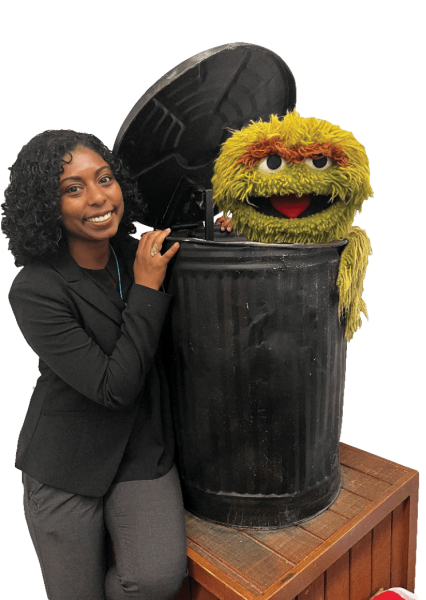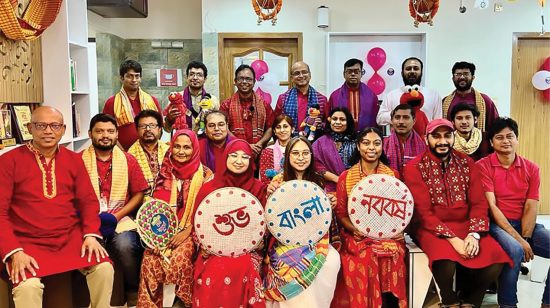From Hinesville to Sesame Street
Deborah Marie Rodríguez García embraces cultural identity, emerges as global leader

As the senior manager of education for Sesame Workshop’s humanitarian programs, Deborah Marie Rodríguez Garcia (’10, ’12) reaches some of the planet’s most remote communities to provide education to refugee children while promoting the power of play-based learning to their caregivers.
Sharing relatable stories and human experiences are core to her efforts, and it was an exploration into her cultural identity in the Georgia Southern University community that became a foundation as she went on to serve some of the world’s most vulnerable populations.
Born into a bilingual, military family from Puerto Rico who moved generously, Rodríguez Garcia’s affinity for languages piqued early. Stationed at Fort Stewart throughout most of her childhood, enrolling in the Modern Languages program on Georgia Southern’s Statesboro Campus felt natural.
“Languages have always been something of interest for me, which is why I decided to study it at Georgia Southern,” she said. “I never had formal training with Spanish. I was raised speaking it, but I didn’t know how to read or write it. Also having traveled, I recognized the connection between language and culture and identity. There’s so much that you gain from studying the language and the literature that is created with that language.”
What Rodríguez Garcia didn’t anticipate was that her studies of Spanish grammar and Hispanic literature would take her on a path of self-discovery. At first, it was uncomfortable.
“There was some area of soul-searching, because there were times where I would get frustrated,” she said. “Why do I not know more about my first language? I am not great at phonetics and having colleagues who were learning Spanish for the first time doing better in that area than me was hard. So there was this big identity crisis that I was going through in terms of understanding who I am as an Afro-Latina and feeling in-between worlds. Even though I identify as Puerto Rican, maybe someone else wouldn’t give me that identity.
“In hindsight, I’m thinking, ‘your identity is what?’ You make it. All of that was happening as a result of being engaged in this program.”
Embracing her identity was empowering. As a member of the Phi Eta Sigma Freshman Honor Society, Gamma Beta Phi Society, Sigma Delta Pi National Collegiate Hispanic Honor Society and Future Business Leaders of America, Rodríguez Garcia became a founding member of Georgia Southern’s first Latina sorority, the Alpha Tau chapter of Hermandad de Sigma Iota Alpha, Inc. The next semester, a chapter was initiated on the Armstrong Campus, and in her senior year she founded the Latin Rhythm Dance group. Both entities continue today.
“It’s really exciting,” she said. “Trying to bring about awareness and a community for Latin women and Latin people to promote leadership and community service was my big aim.”
She earned a President’s Volunteer Service Award from The White House, and graduated summa cum laude before returning to earn a master’s in modern languages. Digging deeper into Hispanic linguistics and Latina writers in the U.S., she was greatly influenced by professors David Alley, Ed.D., and Jorge W. Suazo, Ph.D.
“They are always going to be a phenomenal source of inspiration for me,” shared Rodríguez Garcia. “They created a joyful learning environment. It was something to look forward to every day. That’s an element that I try to carry with me.”
As a graduate assistant to Alley, Rodríguez Garcia learned about his time in the Peace Corps and was intrigued. She signed up, and following graduation moved to the Caribbean coast of Nicaragua for the next two-and-a-half years to train high school and college teachers.
By then, she was proficient in Spanish but had to learn Creole, the primary language of the indigenous population, as she acclimated among humble settings.
“It’s given me a perspective on the world that will stay with me forever,” Rodríguez Garcia. “In that time, I lived with a host community and a host family. I ate the way that they ate. I slept in the same kind of home that they slept in.”
During that period she met her husband, who also served in the Peace Corps. Later, they moved to Malawi for four years where she worked with the U.S. State Department and as a consultant for multiple organizations.
“It was again, a whole new world, but with less training wheels,” she said. “In Nicaragua, I had to learn Creole, but I always had Spanish to fall back on. In Malawi, I had nothing.”
Stationed in one of the poorest countries in the world, Rodríguez Garcia learned Chichewa, “a spinoff of Swahili.” Rodríguez Garcia also encountered other barriers.“In Nicaragua, especially having been on the Caribbean coast as an Afro-Latina, I was able to assimilate more easily, and there were more freedoms and comforts,” she said. “In Malawi, it’s much more conservative. It was a challenging and interesting and beautiful journey.”

After seven years abroad, Rodríguez Garcia and her husband moved back to the U.S. She applied for the role of education manager for Sesame Workshop’s humanitarian programs and transitioned to the new position with the iconic nonprofit organization a month before the pandemic hit.
Rodríguez Garcia’s main charge with Sesame, the world’s largest informal educator that reaches more than 150 countries, is working with Rohingya refugees who fled Myanmar and now live in a massive resettlement community, Cox’s Bazar, in Bangladesh. Technology is largely cut off in the camp and she and members of her team have to be creative to deliver education to hundreds of thousands of children.
In partnership with aid organizations like International Rescue Committee, BRAC and the LEGO Foundation, educational campaigns centered around Sesame Workshop’s Play to Learn program were initiated, grassroots-style.
“We created programs where we train facilitators to work with teachers to integrate this content into their classrooms, or the facilitators actually go to families homes and work one on one with the mothers and fathers to give them skills and understanding on what child development is. The strong emphasis is on play because we want it to be very joyful in that.”
Sesame Muppets Noor and Aziz, 6-year-old twins living in a Rohingya refugee camp, also debuted. The characters allow the children to recognize themselves in the young character faces, gently break stereotypes of girl-and-boy roles, and serve as an element of cultural preservation.
Recently, Rodríguez Garcia also wrapped a project with the Pakistani government to integrate some of Sesame’s remote learning content into their public school curriculum, and is currently working on a teacher development program in Nigeria.
“It’s a great way to tie all of the work that I did in Nicaragua and Malawi to Sesame and really hone in on supporting teachers,” she said.
“We have to really educate these stakeholders about how children learn and how their natural curiosity can be tapped into to allow them to gain learnings in a way that is very child-centric. And it helps that we have a lot of research to back up our work. All of our work is informed with rigorous studies to make sure that we are actually achieving the outcomes that we’re hoping to achieve.”
Rodríguez Garcia’s work has garnered attention, as Georgia Trend and Georgia Southern’s Alumni Association included her on their 2021 and 2019 “40 Under 40” lists, respectively. The sorority she co-founded named her the 2019 Graduate Alumna of the Year, and she remains active as the treasurer for the graduate chapter for Georgia and South Carolina. She is also a WISE Emerging Leader, following a recent nine-month fellowship with 22 other educational leaders from around the world.
Accolades aside, Rodríguez Garcia can’t wait for a bit of playtime herself.
“I’m looking forward to being able to go back out dancing again. I’m ready to work on my salsa game,” she said with a smile.
— Melanie Bowden Simón
